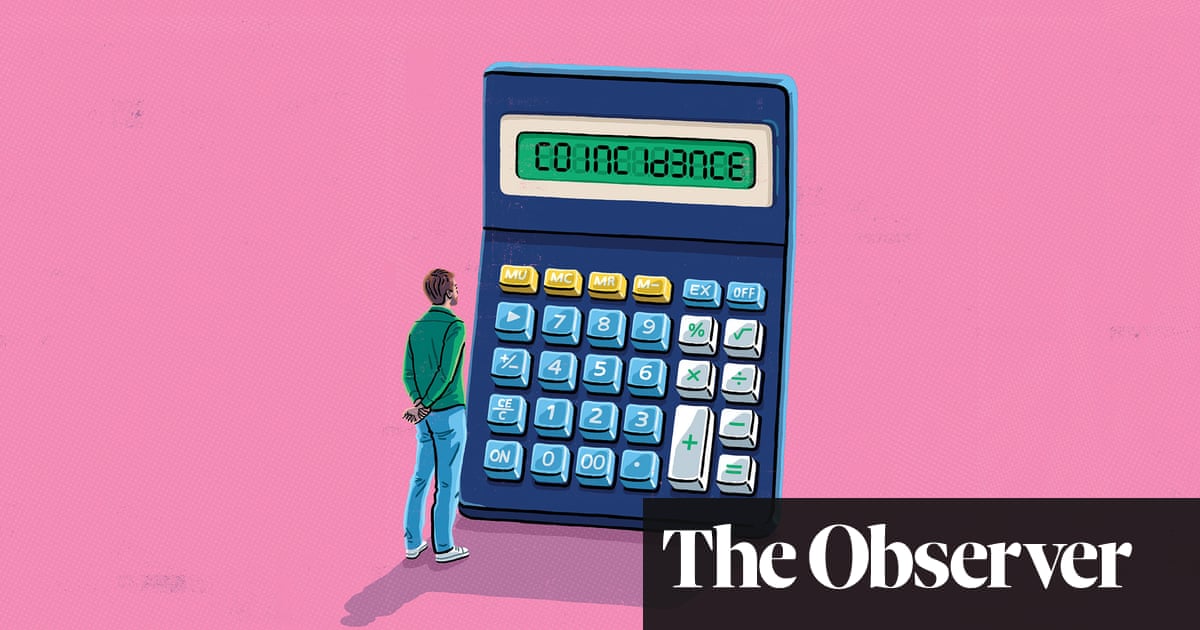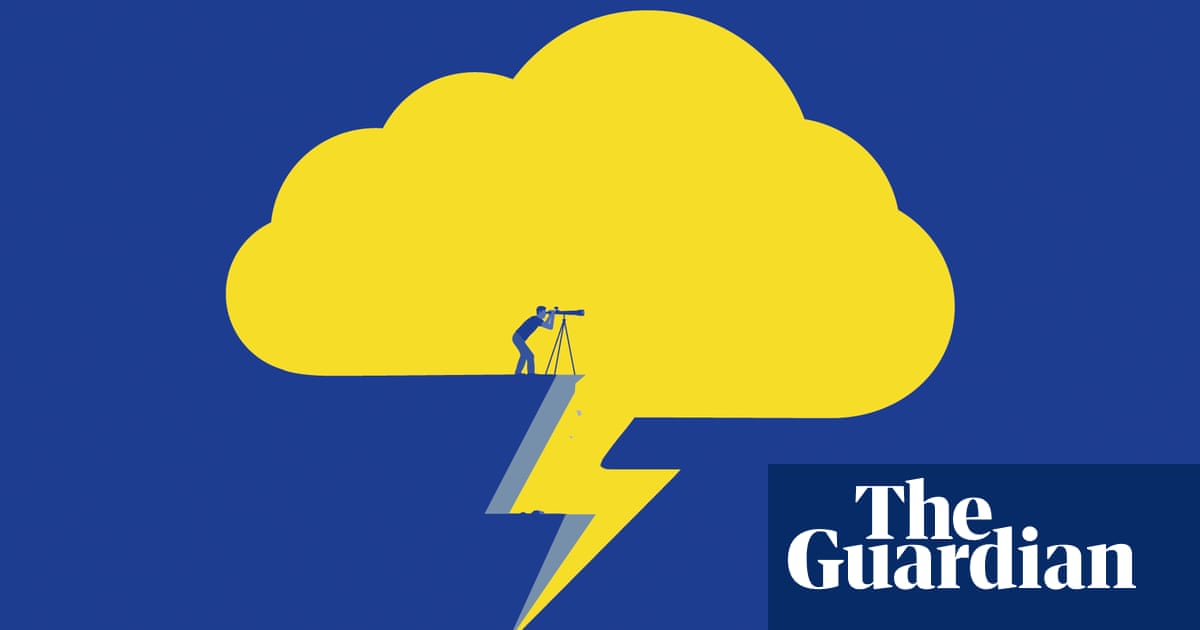
When the mathematician Dr Kit Yates sees a weather forecast predicting a 25% chance of rain, he packs an umbrella. When he meets someone who shares his birthday in a crowded room, he is not in the least surprised. And if he comes across an unfamiliar phrase, such as “the Baader-Meinhof effect”, he knows he is likely to encounter it again, very soon.
“One of the biggest things I learned from writing my book was that surprisingly unlikely things can and do happen, given enough opportunities,” Yates says, referring to his new book, How to Expect the Unexpected.
In it, he explores how we can make better, scientifically informed predictions about the world around us, using maths. “Mathematics can provide us with the objective tools to bypass the foibles of our own biology – the limitations imposed by our own thought processes, the compulsions that ultimately make us human, but let us down when it comes to making inferences about the world around us,” he writes. “They are humanity’s shortcuts: the preconceptions and cognitive biases, refined over millennia of evolution, that all too often lead us astray when we try to apply our brain’s old rules to our society’s new environments.”
No matter how tempting it is to think, “Ooh, that’s a bit spooky” when faced with a completely random coincidence or chance occurrence, we should all be expecting unusual things to happen all the time, he says.
Yates describes a person who, when browsing in a secondhand bookshop far from where they grew up, opens a copy of their favourite children’s book, only to find their own name inscribed inside. Yet, he says, “the law of truly large numbers” dictates that, just as someone wins the lottery almost every week, with enough opportunities, such extraordinary coincidences are far more likely to happen than you might think. “There are so many different types of coincidences that make us say: ‘Well, that’s extraordinary.’ But it’s not unlikely that some of them happen to us every so often.”
Yates gives an example of a seemingly extraordinary coincidence that will always occur: in a room of 367 people or more, at least two people will share a birthday. He can be certain of this because, as there is a maximum of 366 days in any year, including a leap year, 367 different birthdays do not exist.
Even when there are fewer people in a room, the likelihood that at least two will share a birthday remains high: over 70% in a class of 30, as many school-age children can attest.
Reframing coincidences and random occurrences in this way can help us to expect the “unexpected” in life and “avoid the magical thinking that almost naturally accompanies a coincidence”, Yates says. “Instead of feeling spooked when unusual things happen, or jumping to false conclusions about why they happened, we should enjoy them and look for the way we’ve spotted them. That’s the really interesting thing about coincidences for me.”
Yates wrote the book because he thinks, in general, we need “a more numerate society to stop people from exploiting innumeracy and lying to us with figures and statistics” – and that means becoming more aware of “the biases that afflict us”.
One example is the normalcy bias, which prevented passengers onboard the Titanic from leaving a sinking ship. “Many people couldn’t shake this idea that they were on an unsinkable ship, so lifeboats went out under capacity.”
Normalcy bias is also likely to be the reason why a large proportion of the UK population has not made a will, he says. “All of us assume that this isn’t going to be our last day. We’re banking on that implicitly. But actually, for some of us, there won’t be that many more days.”
Similarly, at the start of the pandemic, it became clear that the UK government and others around the world suffered from an exponential growth bias in relation to Covid infections. This is where you underestimate the speed of growth of exponential processes, assuming they will grow more slowly than they do. “That meant we didn’t respond efficiently in the early stages of the pandemic,” says Yates, who sat on the Independent Sage committee.
As well as holding these biases against non-linear predictions in favour of expecting things to just carry on as they are, the uncertainty of life can also make it hard for us to predict the future accurately. “I think some of the reasons why people reached for conspiracy theories, particularly during the pandemic, was they were trying to take back control and deal with uncertain situations that they were finding scary. The book explains that it’s good to acknowledge uncertainty – that our world is uncertain, that randomness can confound us. But sometimes we can use randomness for our own purposes.”
For example, Yates used to struggle to choose a meal in a restaurant, fearing he would not choose the best option. Now, he knows that if he flips a coin between two options, he will make that decision much faster. “You don’t actually have to take whatever option is dictated by the coin, but it puts you in the situation of seriously contemplating that choice.” In this way, utilising the power of randomness can help you to avoid what is known as “analysis paralysis”.
Yates hopes the book will help people gain insights into the accuracy of predictions. Before he wrote it, he used to believe the weather forecast for his home town, Manchester, was often inaccurate. This was because he did not understand what the probability of precipitation in a weather forecast meant, he says. “Because of our tendency to binarise things, I’d see a 75% chance of rain and round that up and say, well, it’s definitely going to rain. And similarly, when the forecast said there was a 25% chance, I’d be surprised when it did actually rain on that day.”
He now knows that such a forecast should be interpreted as the probability of rain in a particular area (be it a region, city or postcode) at a particular time, multiplied by the proportion of that area that will see rain. So, when the probability of precipitation is 25%, it could be that the forecaster is certain it will rain, but only in 25% of that area – or it could be that one in every four times this prediction is made, the forecaster is expecting absolutely everyone in the area to get wet.
Yates now takes an umbrella with him when he goes out, even when the chance of precipitation during that hour, in that place, is relatively low. “I’ve changed how I plan my day,” he says, adding that more broadly, “what I’ve learned is there are lots of ways forecasts will not conform to our expectations, and still be right”.
As for the Baader-Meinhof effect, he actually experienced this while researching his book. “The Baader-Meinhof effect is where you encounter an unfamiliar piece of information – a phrase, a word or a name – and soon after, you come across it again. And sometimes, you have this tendency to think, ‘That’s a bit weird: I’ve never seen that before and now I’m seeing it all over the place – what’s going on?’”
For example, he thought he had never come across the figure PT Barnum until he learned about Barnum statements, the general all-purpose statements that psychics and astrologers use to convince people they know something about their future. “A few weeks after that, I watched The Greatest Showman with my kids. And PT Barnum was the main character.” But he then realised he had come across Barnum before, in the film Gangs of New York. “He wasn’t a big enough character for me to pay attention to him then – only when his name came up twice in relatively close proximity.”
This experience emphasised to him that, in fact, the Baader-Meinhof effect “is just a trick of your memory. Something unusual sticks in your mind, which you might have noticed before – but you didn’t. And now that you’ve clocked it, you see it over and over again.” He now expects to experience the Baader-Meinhof effect frequently and is never surprised when he does. (As he writes in the book: “if you’ve not heard of the Baader-Meinhof effect before, the chances are you will hear of it again soon.”)
Writing a book about how to expect the unexpected has also taught him a very valuable lesson he did not expect: how important it is for him to “live in the moment” with his young children, to whom the book is dedicated. Predicting and preparing for the future with savings and insurance policies, for example, is important, he says – but it should never be your only priority, “because what if you don’t make it?” Yates never wants to lose sight of the uncertainty the future holds. “To some degree, you’ve got to live for today, take advantage of what’s happening now… and enjoy it.”
How to Expect the Unexpected by Dr Kit Yates is published by Quercus at £25












